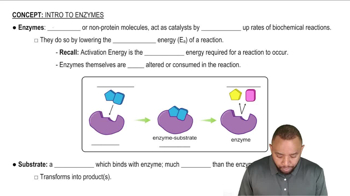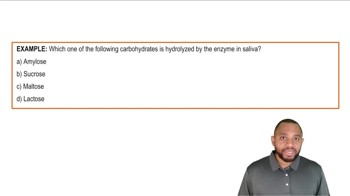What type of enzyme regulation occurs in the following situations?
d. Conversion of isocitrate to α-ketoglutarate is inhibited by high levels of ATP. (Hint: ATP is neither a product nor a substrate in this reaction.)
 Verified step by step guidance
Verified step by step guidance



What type of enzyme regulation occurs in the following situations?
d. Conversion of isocitrate to α-ketoglutarate is inhibited by high levels of ATP. (Hint: ATP is neither a product nor a substrate in this reaction.)
What general kinds of reactions do the following types of enzymes catalyze?
b. Decarboxylases
What general kinds of reactions do the following types of enzymes catalyze?
c. Lipases
Describe the reactions that you would expect these enzymes to catalyze.
b. Aspartate transaminase
Name the enzyme whose substrate is
a. Urea
What general effects would you expect the following changes to have on the rate of an enzyme-catalyzed reaction for an enzyme that has its maximum activity at body temperature (about 37°C)?
a. Raising the temperature from 37°C to 70°C